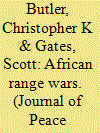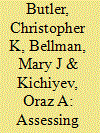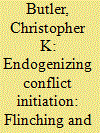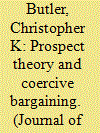|
|
|
Sort Order |
|
|
|
Items / Page
|
|
|
|
|
|
|
| Srl | Item |
| 1 |
ID:
110803


|
|
|
|
|
| Publication |
2012.
|
| Summary/Abstract |
This article examines the effect of climate change on a type of armed conflict that pits pastoralists (cattle herders) against each other (range wars). Such conflicts are typically fought over water rights and/or grazing rights to unfenced/unowned land. The state is rarely involved directly. The rangeland of East Africa is a region particularly vulnerable to drought and livestock diseases associated with climate change. To analyze the possible effects of climate change on pastoral conflict, we focus our analysis on changes in resource availability, contrasting cases of abundance and scarcity. The role of resources is further contextualized by competing notions of property rights, and the role of the state in defining property and associated rights. We employ a contest success function (CSF) game-theoretic model to analyze the logic of range wars. This CSF approach emphasizes the low-level, non-binary nature of raiding behavior between pastoralist groups over limited natural resources. A central contribution of this approach is that the logic of raiding behavior implies a positive relationship between resources and conflict. This positive relationship is supported by several studies of the rangeland of East Africa, but is generally dismissed by the literature on the 'resource curse'. This relationship is contingent on other factors examined in the model, producing the following results. First, the level of property rights protection provided by the state generally reduces conflict between pastoralist groups. Second, if property rights protection is provided in a biased manner, then conflict between pastoralist groups increases. Third, severe resource asymmetries between two pastoralist groups will induce the poorer group to become bandits (focusing their efforts on raiding and not producing), while the richer group raids in retaliation.
|
|
|
|
|
|
|
|
|
|
|
|
|
|
|
|
| 2 |
ID:
078839


|
|
|
|
|
| Publication |
2007.
|
| Summary/Abstract |
Bargaining at various levels has taken on a greater role in our understanding of international relations. work presented a model in which bargaining at the international level would result in the status quo advantaged actor getting his ideal agreement. We conducted a face-to-face experiment between sixty-eight pairings of men to test this prediction in a controlled setting. All of the participants were presented with the same bargaining problem in different contexts. For each pairing, we collected data on a trial bargaining period under a "classic" Nash bargaining problem (under private information, but without monetary incentive) and two bargaining periods with an underlying unidimensional issue space (i.e., Milner's model, once under private information, the other under full information, each with monetary incentive). While the Nash bargaining solution was consistently chosen under the "classic" Nash bargaining problem, it was rarely chosen when the bargaining problem represented an underlying unidimensional issue space. For the unidimensional bargaining problem, private information did not facilitate producing any consistent outcome; under full information, the "equity point"-in which each participant earned the same dollar amount-was chosen significantly more often than any other outcome, even under a context in which the equity point was incentive incompatible for one actor to agree to that agreement. The overall results suggest that the Nash bargaining solution is predictive when it is also a focal point in the bargaining space, but is only prescriptive in a bargaining space with many mutually improving points. Finally, private information allowed the status quo advantaged actor to get a better deal compared to the full-information condition.
|
|
|
|
|
|
|
|
|
|
|
|
|
|
|
|
| 3 |
ID:
050368


|
|
|
| 4 |
ID:
076881


|
|
|
|
|
| Publication |
2007.
|
| Summary/Abstract |
Despite many applications of prospect theory's concepts to explain political and strategic phenomena, formal analyses of strategic problems using prospect theory are rare. Using Fearon's model of bargaining, Tversky and Kahneman's value function, and an existing probability weighting function, I construct a model that demonstrates the differences between expected value and prospect theory when applied to strategic interaction. Critically important to this demonstration is an examination of different types of reference points that make sense for bargaining problems. Four types of reference points are discussed and analyzed: power-based, equity, variants of the status quo, and extreme ``I-want-it-all'' reference points. Each of these types of reference points produce different bargaining behavior at the individual level and in combination with the type of reference point of the other actor. Additionally, I demonstrate that bargaining failure is possible for this model under complete and perfect information using prospect-theoretic logic
|
|
|
|
|
|
|
|
|
|
|
|
|
|
|
|
|
|
|
|
|